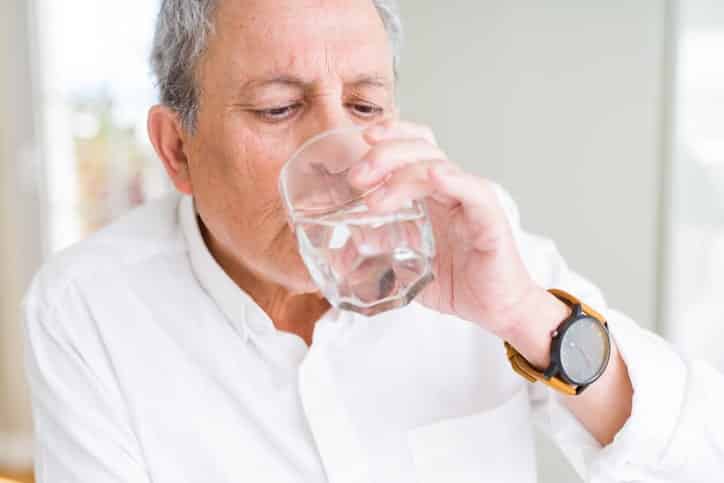What are the signs of dehydration in seniors?

Do you drink enough water on a daily basis? What about your elderly loved ones? Many of us don’t! And because we lead busy lives and have dozens of things to worry about on a daily basis, we often forget to hydrate properly. When you’re younger you can sometimes get away with not drinking enough water every day, but seniors are at a greater risk of dehydration for several reasons:
- They’re less sensitive to feeling thirsty
- Their kidneys are less efficient, meaning their urine contains more water
- Their ability to keep balanced fluid levels is decreased
- They’re often on certain medications that can dehydrate them more quickly
So what are the signs of dehydration in seniors? What should you be watching out for? Here are some of the mild and more severe symptoms of dehydration in seniors, to help you ensure your elderly loved ones are properly hydrated.
Mild symptoms of dehydration
- Headaches
- Dry mouth
- Dizziness
- Feeling weak
- Sleepiness
- Muscle cramps
While these symptoms sound general and can also be signs of something else, if your elderly loved one experiences any of these symptoms, ask them how much water they’re consuming on a daily basis. If they don’t know or can’t remember, monitor their water intake over the next few days to ensure they’re drinking enough, and see if any of their symptoms are alleviated.
Severe symptoms of dehydration
- Confusion
- Difficulty walking
- Severe cramps and muscle contractions
- Low blood pressure
- Bloated stomach
- Sunken eyes
- Breathing more quickly than normal
If you notice your loved one experiencing any of the above symptoms, give them a big glass of water and contact their doctor immediately. Dehydration can cause a range of serious health problems for seniors, including seizures, heat stroke, kidney complications, and fainting.
How much water does my elderly loved one need?
The best way to find out how much water your loved one needs on a daily basis is to speak with their doctor. Certain factors will impact their daily water intake. For example, seniors who live in hot climates will need more water than those who live in cooler climates, and seniors who are on particular medications may need to adjust their water intake due to medication side effects.
Benefits of being properly hydrated
Seniors who have an adequate daily water intake are less likely to be constipated, less likely to have a fall, and are at a reduced risk for urinary tract infections. All of these things can be very harmful for older adults, so staying well hydrated is essential as we age. Proper hydration also improves brain performance, boosts energy, and encourages healthy metabolism function.
If you find that your elderly loved one has trouble remembering to drink enough water on a daily basis, some people find that setting alarms throughout the day serves as a good reminder. You can also turn it into a family game where everyone encourages one another, and you can buy your senior loved one a large water bottle with measurements on it so they know exactly how much they’re drinking.
If you have any questions, or would like more information about signs of dehydration in seniors and how to prevent it, please contact our team at UMC today. We look forward to hearing from you.





